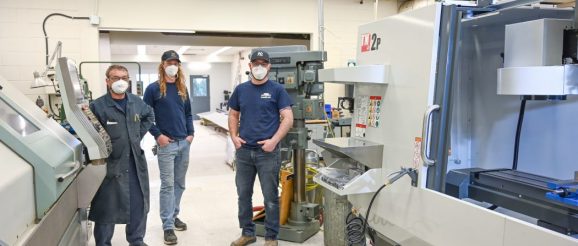Machine shop renovations support Brock research, innovation

Brock University’s Machine Shop is undergoing a major renovation.
For 55 years, the Machine Shop in the Faculty of Mathematics and Science (FMS) has supported the Brock community, campus wide. The team of talented machinists, innovators and fabricators has solved countless challenges through creative artistry and dedication.
Recognizing the importance of upgrading the shop to remain at top efficiency, FMS Dean Ejaz Ahmed approved a funding proposal created by Technical Services Manager Tom MacDonald and Machine Shop Supervisor Stephen Renda. Work began in January and is expected to be completed this fall.
“The project, which almost doubled the main shop’s size, represents an unprecedented influx of capital funding approaching $300,000,” said Renda. “Since our inception in the mid-1960s, we have not had this kind of opportunity, and I need to extend my gratitude as well as our entire team’s. We are all excited and humbled.”
Ahmed said research at Brock is “thriving.”

Workers from Kenco Machinery Movers recently delivered a new Computerized Numerical Control milling machine to Brock University’s Machine Shop.
“With the new Engineering Department and overall increase in creative projects campus wide, it is imperative that our facilities can manage the influx of innovation,” he said.
The Machine Shop expansion project required hundreds of hours of research and planning by Renda and his team. He collaborated with Facilities Management, who took expert care in shaping the new space, including challenging structural renovations.
Along with an expansion to the space, which is found in D-Block of the Mackenzie Chown Complex, two state-of-the-art machines were purchased to increase the shop’s capacity.
The first is a waterjet machine with a four-foot by four-foot work envelope that uses water to cut through almost any material up to seven inches thick, including metals, plastics, ceramics and glass.
“Cutting capability was pivotal in the purchasing of this machine, compared to plasma or laser cutting, which have cutting limitations,” said Renda.
The second purchase, a new Computerized Numerical Control (CNC) milling machine, has more than double the travel size and spindle speed capacity of Brock’s previous model. It features a rotary tool indexing for up to 10 tools and a probe system to speed up the setup of workpieces and tooling.
“The machine will not only enable projects to be done more efficiently, but also allow us to offer a wider arrangement of services to complete the endlessly creative ideas the Brock community brings us,” said Renda.
He said examples of the many projects the shop has produced include a Rothamsted trap for Biological Sciences — a large vertical tower for extracting insects from up to 50 feet in the air. The trap, now at the DeCew Falls generating station, uses a large electric fan to create suction, pulling insects down through a pipe into a small plastic bottle for collection and study.
For the Physics Department, the shop crafted Reflectance Spectroscopy Chambers — large aluminum vessels coupled with a light source. Material properties are studied within the device, which moves samples up and down and rotates them under a vacuum environment to collect data.
Ahmed is pleased with the renovation’s progress and the potential for future innovation.
“We are investing in the future and I am happy to support this project through my strategic fund,” he said. “We are providing service to the entire Brock community. I appreciate the financial support from Faculty of Applied Health Sciences, Office of Research Services, Faculty of Social Sciences and Facilities Management that contributed to this important project,” he said.
